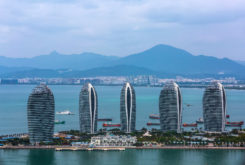Portugal´s European partners and the US have been restless with the country´s ever closer ties to China, and what until now was discrete, behind the curtain lobbying, has turned to public opposition and veiled threats.
The US Embassy in Portugal, in order to publicly manifest its opposition to an agreement for Chinese company Huawei to install a 5G celular network in Portugal, invited a small group of journalists in the final days of February to a conference with the chairman of the Federal Communications Commission (FCC), Ajit Pai, at the end of his visit to Portugal.
The visit, Ajit Pai said, had a clear goal: to warn that China’s participation, notably Huawei, “poses a risk” that Portugal should not take, for it would create discomfort in the North Atlantic Treaty Organization ally.
The ambassador of the United States, George E. Glass, went further saying that while Portugal is one of the US closest allies, namely in NATO, ties with China in telecom network development make sharing critical information through networks unsafe, therefore affecting relations with Portugal.
The protection of the telecom infrastructure in Portugal, the diplomat said, is a matter the US sees as “urgent.”
Ajit Pai led a US delegation to Portugal that established contacts with the Government (Ministry of Infrastructure and Housing and the Ministry of Foreign Affairs), companies and regulators Autoridade Nacional de Comunicações(Anacom).
The matter has been picked up by the main opposition party, PSD, whose Vice President Rubina Berardo has demanded to see the agreement between the Portuguese telecommunications group MEO and Huawei for the development of 5G technology.
The agreement was signed at the end of 2018, during the visit to Portugal by Chinese President Xi Jinping.
According to reliable sources, US concerns had been expressed to the Portuguese authorities behind the curtains, but the government´s lack of response prompted the embassy to go public.
In fact, a similar episode to attempt to block Chinese investment took place last year in a tech hub outside Lisbon, TagusPark, considered the country´s most important, and where various US tech companies, including Google, have their Portuguese headquarters.
TagusPark belongs to Portuguese construction group Teixeira Duarte, that was close to signing on a deal to sell the infrastructure to a Chinese group, which prompted US concerns, and ultimately led the ambassador to meet urgently with various entities, including the mayor of the municipality of Oeiras.
The lobbying included threatening that the embassy would advise all US companies to leave TagusPark, leading to the sale agreement with the Chinese group to never be signed.
At the end of January, TagusPark was visited by the deputy minister of Commerce of the People’s Republic of China, where he was received by the vice-president of the Oeiras municipality, Francisco Rocha Gonçalves.
During the meeting, the possibility was raised that major Chinese tech companies establish headquarters in Oeiras.
Portuguese openness to Chinese investment has also exposed the country´s authorities to pressure from their European partners.
In December last year, European Commissioner for the Digital Single Market, Andrus Ansip, expressed concern about Huawei’s expansion in Europe, because Chinese technology companies may be forced to provide information to China’s secret services.
The European Parliament recently approved new regulations for sorting out investments from outside the European Union, amidst concerns that China and other countries will seek to conduct industrial and military espionage through technology infrastructures.
In an article published on the eve of Xi Jinping´s arrival in Lisbon, former Portuguese secretary of State Bruno Maçães said Portugal currently faced “one of the most important foreign policy choices of the last decades” – in its adhesion to the Belt, and Road initiative.
“Germany and the US have pressured the Portuguese Government to give Xi Jinping a negative answer, but the biggest pressure came from Paris, with president Macron informing, through diplomatic channels, that he will be very disappointed with Antonio Costa if the reply is positive” to the Chinese strategy, Maçães wrote in an article published in Portugal´s main weekly, Expresso.
The Portuguese Government has totally dismissed such concerns, and went ahead and signed the agreement at the end of the Chinese president´s visit.
Portuguese prime-minister António Costa even went further in a interview with the Financial Times on Sunday, saying European protectionism against countries such as China is exaggerated.
“One thing is to protect strategic sectors, another is to open doors to protectionism”, Costa said.
Portugal´s “experience with Chinese investment has been very positive” and “the Chinese showed total respect for our legal structure and market rules”, the prime minister added.
Specifically regarding the potential risks arising from the involvement of Huawei in future 5G networks, Costa said Portugal “is listening, of course.”
“But it is very important not to stop the modernization of Europe’s digital infrastructure” and Europe needs to invest more in education and research and increase cooperation among member states, “instead of closing borders to innovation from abroad”, Costa added.
The most recent update of the ranking by the Rhodium Group and Mercator Institute for China Studies on biggest investments by China in terms of European countries´ GDP reveals that Portugal was, along with Finland, the country where Chinese capital inflows were more sizeable since 2000, in relation to its economy.
Chinese investment worth 3.1% of GDP – only slightly below Finland´s 3.2% – makes Portugal the second Eurozone country with the most Chinese investment, well above the 0.8% average for European Union countries.
The size of investment grew considerably during the 2011-2013 crisis, which forced the Portuguese Government to privatize its stake in utilities such as EDP – Energias de Portugal (which now has CTG – China Three Gorges as its main shareholder) or REN – Redes Energéticas Nacionais (controlled by China State Grid), and subsequently in banking or health, and has been mostly welcome in Portugal.
But this wave of investments had raised alarms in Brussels, and even more so after CTG launched a 10-billion euro takeover bid for EDP, dependent on the acceptance of the offer by the Portuguese government, that, through Prime Minister António Costa, almost immediately gave its agreement.(CLBrief)



